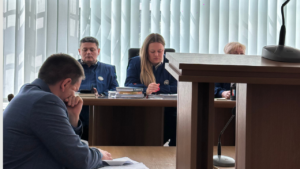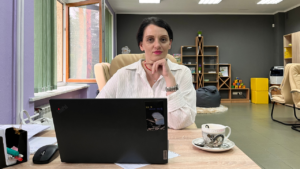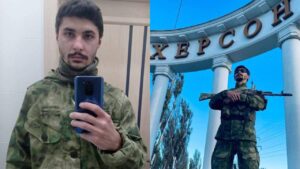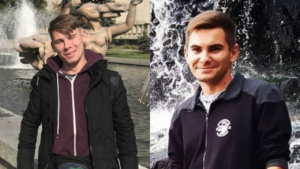Safeguarding the Law and Process: Defending the Accused in International Criminal Proceedings
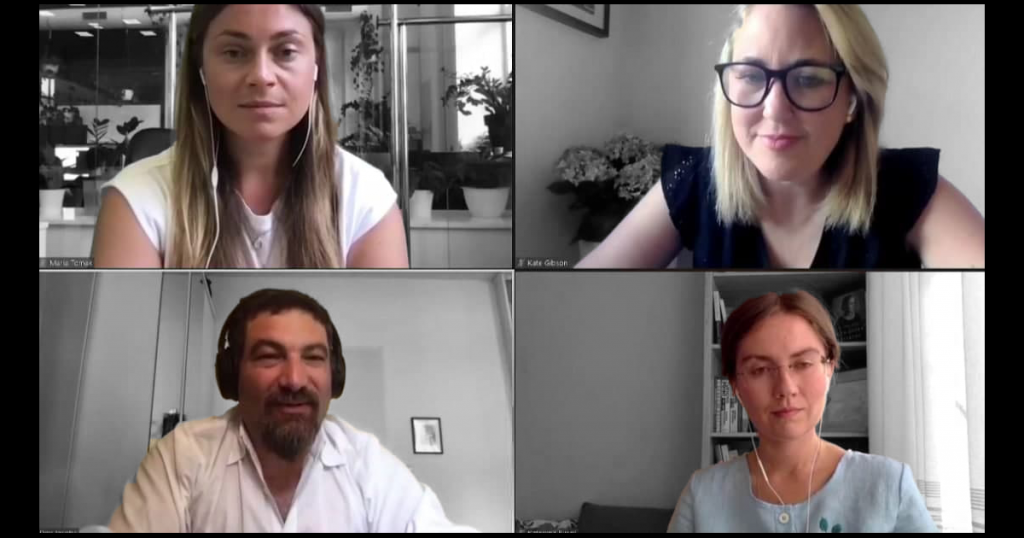
Discussion on the role of the defence counsel in the international courts with Kate Gibson and Dov Jacobs
Nuremberg Principle V states: “Any person charged with a crime under international law has the right to a fair trial on the facts and law”.
The right to a fair trial includes the right to defence. However, the role and responsibility of defence counsel is not limited just to their clients. The qualitative organisation of the defence helps balance criminal proceedings, it makes it more argumentative and competitive. This legitimises both a trial and its judgment – not only from a point of law but, first and foremost, in their perception by a given society and the international community.
The organisation of defence in extraordinary cases – such as those concerning war crimes or other atrocities – has a particular resonance. In such contexts, a society is usually quite polarised, has pre-established perception about the culpability of the accused and defence lawyers may even face open hostility.
Ukraine views the majority of Crimea and Donbas issues through a convictory prism of criminal proceedings. By this webinar moderators Maria Tomak (Coordinator, Media Initiative for Human Rights) and Dr Kateryna Busol (Lawyer, Centre for Defence Strategies) attempted to get the view of the other side of the process and to analyse various aspects of the work of defence counsel at the International Criminal Court with two distinguished international guests Kate Gibson (Defence Counsel, International Criminal Court) and Dov Jacobs (Defence Counsel, International Criminal Court; Founder, Strategic International Legal Consulting). The video of the conversation is available here: https://www.youtube.com/watch?v=7TSfnFDYIb0&t=1620s
On two biggest myths about defence counsel and why the advocates’ role and responsibility is not limited just to representing their clients:
Kate Gibson: We play a larger role in the international criminal justice project and one that is often misunderstood and mischaracterised. Often we are associated with our clients. We are seen as anti-establishment, anti-truth, anti-justice. And that’s really the wrong mindset. Because the defence lawyers are not the enemy. We are not even necessarily that evil. We are part of this criminal law justice project, we contribute to it and we strengthen it.
There are two biggest myths about the work of defence counsel and I will tell you why they are wrong.
Myth 1: the role of defence counsel is to try to get their clients acquitted. That’s not accurate. That’s not an accurate description of our role within an international criminal trial. If I had to sum up what our role is in one phrase, it would be: assisting the judges by testing the prosecution evidence and fighting for the fair trial rights of the accused. Defence lawyers are this living breathing safeguard for fair trials. The defence lawyers are these fair trial warriors in the courtroom standing up every day and reminding everybody about human rights that are in play, the human rights of the accused that have to be respected. We are ones standing up and saying “Tell the accused what the charges are”, “Make the indictment more detailed”, “Disclose exculpatory evidence”, “Look for exculpatory evidence”, “Keep the trials in open session”, “Remember the burdens of proof”, “Remember presumptions of innocence”. That’s how we strengthen, that’s how we contribute to these trials. We are this moral conscience in the courtroom.
And the second half of our role is helping the judges by testing the prosecution evidence. The prosecution comes and presents its case. It gives the judges its case theory and then brings oral evidence and documentary evidence. And the prosecution has that all admitted into the record of the case essentially to try and prove three things. First, that the crimes have actually happened. Second, that these crimes rise to the level of international crimes. And, third, that this accused in this trial is responsible for those crimes – that he planned the crimes, that he ordered the crimes, that he was part of the conspiracy to commit them, that he was in charge of the perpetrators. That’s what we call the linkage evidence between this accused and the crimes. Our job is to test all of that. To help the trial chamber to see whether they can rely on this evidence, whether or not it’s credible evidence, whether it’s relevant evidence, whether that’s reliable evidence. Our testing of the evidence helps the judges in that way. And how do we do that? We can do that though cross-examining prosecution witnesses, challenging documentary evidence when it comes to court or we can do that though putting a positive defence case – calling our own witnesses, our own evidence to try and test what the prosecution is saying. Essentially, this is what our job is about. And the reason that we do that is, at the end of the day, when the trial chamber deliberates and makes its findings of fact that it then relies on to make legal findings, it’s making those findings knowing that the evidence it is relying on has been thoroughly tested by the defence lawyers. We are very helpful to this process.
Myth 2: the role of the defence counsel is to deny that the crimes occured. No, that’s not what our job necessarily entails. If you go back to those three things that I was telling you the prosecution had to prove, most of the time the defence counsel is not going to challenge all of these three things. On a lot of occasions we are not going to be disputing that the crimes themselves have occured. These are crimes that happened. These are historical facts in many of these cases. And oftentimes we will not even be challenging that they rise to the level of international crimes. In Rwanda we were not saying that these crimes were not genocide, in the former Yugoslavia we were not trying to say that certain acts did not rise to the level of crimes against humanity. In some cases at the ICC we are challenging that level. But in most cases, the role of the defence is to try and test the prosecution’s evidence about the link between the crimes and this accused. Really testing whether or not this accused was giving these orders or was responsible for those troops or gave enough assistance that you can say that he was aiding and abetting these crimes.
Most of the time, to give you a practical example from the Bemba case, which was a case at the ICC against the former Vice-President of the DRC, of the Congo, that case involved a lot of instances of rape and sexual violence. And the prosecution would bring rape victims to give evidence. As Mr Bemba’s defence counsel, we were not trying to challenge these victims and witnesses and try and say that they had not been raped or that they were making it up. At most, we were asking them some questions about dates and times to see if our client’s troops could have been there, maybe about the uniforms that the perpetrators were wearing to see if they could be properly identified. This is what we were trying to test. So this more general idea that defence counsel were these revisionists, or try to deny crimes or rewrite history just is not accurate.
Dov Jacobs: Kate once put on Twitter “Defence lawyers are human rights champions”. It is very important to say. We are doing human rights. We are talking about human rights of the accused and due process in general.
Usually when I teach International Criminal Law, I start with this falsely simplistic question: “What are the purposes of international criminal law?” It is quite interesting. I have been doing this for ten years and usually I do not get “due process” as an answer. I get “truth”, “peace”, “reconciliation”. Usually, if you look at objectives of international criminal law such as peace, justice, truth, reconciliation, reparations, all of those objectives can be achieved outside the courtroom. You can have a truth commission, you can have a reparation process, which is not linked directly to criminal responsibility. You can have a historical commission, which establishes truth. Even punishment – you can be a bit provocative and take … That is retribution. But this is not justice. So, actually, what makes ICL stand apart from other mechanisms is not its objectives of truth, peace and reconciliation, it is fair trial, which is a choice, which we made as a society. And it is very important, it is not a technicality. Due process is not a technicality. No defendant gets off on a technicality. He gets off because the evidence is not good enough, because his rights were respected. Due process is a normative choice in a normative choice, in the same way as a chooice to punish genocide is a normative choice.
I echo what Kate said: we are not here to rewrite history, we are here to write history. We are here to help a judge see out of the evidence something more subtle than often what a prosecutor puts forward. In the Rwandan cases, nobody can accuse the ICTR judges of being genocide denyers. But what came out of the judgments was more subtle than what the prosecutor was alleging about how genocide was allegedly organised, at what level of government is was orhanised. It is not the genocide that the prosecutor sold, it was only possible in most cases because the defence did its job in explaining the evidence and saying you cannot just accept the narrative on face value.
And it is the same in the Gbagbo case I worked on. We based it on the prosecution evidence, explained the judge a different narrative, which turned out to be closer to reality and that’s what judges said. So we did not rewrite history. We contributed to the understanding of the evidence, which was not the Prosecutor’s understanding. One side of truth is always going to win.
Kate said that we are not there to get our clients acquitted. But it is injustice if our clients are not acquitted if there is no proper evidence. That is why the burden of proof is on a prosecutor. Normally we do not have to prove anything. Obviously, as a good defence lawyer, you are going to present your own case, your own counter-narrative. Because psychologically, for a judge, saying that a prosecutor is wrong is one thing, but you need to give a positive alternative to a judge. But the burden is on the prosecutor and this is, again, a choice that we made.
On why people care less about the rights of accused in international criminal trials:
Dov Jacobs: I am always struck by conversations I have with people domestically, friends of mine who are not in law. If you ask them about due process and the presumption of innocence, they will all agree with it. But when it comes to international criminal law, suddenly they don’t, it is not the same. But the reason why we have due process is that we choose a system where we want to make sure that no innocent person goes to jail. And if the consequence is that you are guilty, and then you are free, then this is the choice we make. Because we are all humans. Prosecutors, defence, judges – they are all humans and all imperfect. So we have to choose a system which is either “every person who is guilty goes to jail with a few innocent people”. Or “everybody who is innocent stays out of jail and maybe sometimes a few guilty people stay out of jail”. I prefer the second solution. And we would all do – if we were unjustly accused domestically, we would all want the presumption of innocence to be recognised. That’s the whole point of the principle, it applies whatever the circumstances, whatever our moral preferences, whatever the gravity and how horrible the crime is. That’s a beauty and that’s why we should be proud we have such a system in our democratic societies. That even if you are accused of the most horrendous crimes, we treat you fairly.
When we talk about the international criminal law accused, we talk about the people who are on the news, we talk about the events, which are well documented in NGO reports, in the media. So how can there not be the presumption of guilt? They must have done something wrong. And you see that even in very genuine honest academics. I have a colleague who does extraordinary work on evidence in the ICTY and the ICTR, showing how the evidence is weak. But she concluded her book by saying “But that’s O.K., they must be guilty of something”. I am hardly paraphrasing. And she said “Yes, I agree, this is what I think. It is O.K. to have the system where the evidence is less good, because they must be guilty of something.” You have this kind of presumption of guilt.
These are the objectives I mentioned before. The rights of the defence are continuously balanced out against other objectives – rights of victims, right to truth, difficulty of investigations. It is notoriously difficult to investigate in a conflict zone. Both Kate and I would acknowledge that it is hard for a prosecutor to investigate. But then comes a normative choice: do I lower the bar to make sure that less solid evidence is accepted? Or do I maintain the principle, which is, ultimately, it is not my problem as the defence that you have problems investigating, we set the standard here and you have to respect it. I should not suffer from the fact that you cannot access the crime scene and that states are not cooperating. It’s a real choice. But it’s not obvious, it should not be obvious that necessarily we lower the bar in terms of corroboration, in terms of forensic evidence, etc.
On the collective dimension of international crimes:
Dov Jacobs: We were talking about collective crimes, collective victimhood, collective perpetratorship, massive historical and political context. And the responsibility of the accused is ultimately diluted in that. It’s less important, even with those high-level accused like Bemba or Gbagbo or Karadžić or Mladić, we are still diluting their responsibility and the idea of collective responsibility of a joint criminal enterprise. So it seems that because we are talking about collective aspects, it is not as bad not to respect the rights of the defence.
On why some people do not always appreciate the role of the defence:
Dov Jacobs: One of the reasons people don’t like us is that we show where the system is failing. And nobody likes that. They “shoot the messenger”. I use this metaphor in one of my articles. International justice is like looking in the mirror like in the Snowwhite and asking “Please tell me who is the fairest”. And as the defence are saying “You are not fair”. And people want to try and break the mirror. Because, as Kate said, we are in court every day, saying “I am sorry, this investigation is not right”, “This evidence is not good”, “This document containing the charges is not specific enough” and “the presumption of innocence is not respected”. So ultimately there is this feeling that we are undermining the system. But ultimately we are only trying to make it better. Collectively. We are part of the system.
On the place of the defence within the ICC system:
Kate Gibson: The ICC from the outside can seem quite impenetrable. The institution itself, the ICC, is made of three branches: the Office of the Prosecutor; the Chambers, the judges; and then the Registry. But independent counsel, people like Dov and I who represent victims or accused, are not part of that institution, we are not staff members. We really are independent. For me, it is really important that we operate outside of the Court structure. Because as much as I would love sick leaves or health insurance, I can see quite quickly where my job as representing an accused would clash, would give rise to a conflict if I was a staff member. So we operate outside of the Court, although the Registry administers us and will pay us if our clients don’t have any money.
Dov Jacobs: Some of our colleagues push to be more integrated in the institution. I disagree. We are independent. We should not receive instructions from the Registry. Even though we do, when we are on legal aid, the Registry can sometimes, in a very detailed way, tell us how we should investigate or use our resources, which is sometimes problematic. But we should have the support of the institution, the respect of the institution as an equal, like the Prosecutor, when it comes to what is formally going on in a trial. But I do not think we should formally be integrated within the institution.
On how to become an ICC counsel:
Kate Gibson: One of the parts of the Registry called the Counsel Support Section runs the list of counsel. Once you fulfill certain criteria as a lawyer, you can fill in the forms on the ICC website and you apply to get put on this list. I looked it up this morning: there are 894 lawyers on the ICC list of counsel and one Ukrainian. There is a list of legal assistants, the junior members of defence teams. There are 421 legal assistants and only two from Ukraine. And this is our fault, that is the fault of the institution, of the ICC, the fact that the international criminal lists are so not diverse and not inclusive. There need to be concerted efforts to try and make sure that the lists from which accused can pick are much more diverse.
On how a counsel ends up in a particular proceeding:
Kate Gibson: It is not us who say “I want to be a defence lawyer”. The choice ultimately rests with an accused. The accused has a right to choose his or her own counsel. And so this list, this non-diverse list, is a stepping stone. Once you are on that list, an accused can pick a counsel from that list. Oftentimes the accused who come before the Court already have a lawyer. They have a lawyer from the Congo or from the Central African Republic or from Uganda, and they come with that lawyer. And the ICC actually really affords significant weight to the choice of the accused in their counsel, in their team. And if that person fulfills the criteria of getting on the list, that will happen, and that will happen quickly. But in other cases the accused has to fire blind and try and find somebody they think are competent on that list.
On the background of and diversity among ICL lawyers
Dov Jacobs: There are more and more international criminal lawyers who have only international criminal law experience. If you take the first lawyers at the ICTY, ICTR, they were domestic lawyers. They came with the background of 15 years of criminal law practice domestically, which has its advantages but also its disadvantages. It was O.K. at the ICTY because the system was being invented as it went along by the judges but also by the prosecutors and the lawyers. I think it is more problematic because it is a different job. Obviously, if you have experience of investigations domestically, of being in court, of cross-examining – it is an added value. But you cannot think you can just transition, you cannot automatically jump from a domestic courtroom to an international courtroom. I know it looks bad from the outside, but the fact is that if you are a very experienced domestic lawyer and if you want to jump into an international case, you might not defend your client adequately, and that’s a reality.
Kate said that we have a list of 800 people and that we need to make it more diverse. Definitely. But we should not sell the idea that everybody can become an international criminal lawyer. There are very few cases and that’s just not going to happen. It is a very specialised pool of people. It can be a more diverse pool of people. But if you look at the composition of the defence teams now, actually, in the past years, there has been a transition. There are three female lead counsel now. It is not perfect but it is far more diverse than a few years ago.
But this idea that everyone can be an ICL lawyer and do the job right.. We can talk about diversity. But if I were an accused before the ICC, I would take somebody who is competent. As much as I like diversity, I would want someone I know, who has done this job before. I would not try to suddenly promote a young lawyer because everybody needs to get their chance. These guys are accused of massive crimes, they are going to end up in jail for the rest of their lives possibly. They want someone who has done it, who has got an acquittal.
On the connection of the diversity issue with resources given to defence teams:
Kate Gibson: The resources given to defence teams are not only limited, they are not enough. We did the ICC Bemba case with five people. Contrast that with what you can think is happening at the Office of the Prosecutor, where they have a very large trial team and an investigative division and then an appeals division and a witness protection division. And I don’t have a problem with that per se because the prosecution has the burden of proof and that’s a huge thing for them to carry. They have to prove these cases and we don’t have to disprove a thing. But when you are operating with a team of four or five people, Dov is right, people within that group need to have done that before and that restricts the people who you can bring in, who are new. And also you are going to need the people who share the native language with the client. So at least one or two team members are going to have that link. So, within that framework, Dov’s right, there is not much scope for us to have that wonderful cultural diversity within defence teams – the way they can within the Office of the Prosecutor because they have a lot more roles to fill. But I do not think this is the reason that we should stop trying to be more inclusive. Lawyers just coming from Europe, America, the UK, France, the UK – we do not have all the good ideas. There are lots of good ideas about how to defend an accused, how to approach aspects of war crimes that we have not thought of yet. So diversity still remains important, even if I am being idealistic.
Recommended sources:
- Carolina Buisman, Kate Gibson, Acquitted by Law, Prosecuted by Propaganda (Justice in Conflict, 31 March 2014)
- Mark Kersten, Acquittals and the Battleground Over the ICC’s Legitimacy (Justice in Conflict, 14 March 2019)
- Practitioner’s Handbook on Defence Investigations in International Criminal Trials (edited by the Defence Office of the Special Tribunal for Lebanon, 2017)
- Janet H. Anderson, Plot Twists at the ICC for Jean-Pierre Bemba (Justice Info, 12 March 2019)
- The Right to Remedies after an ICC Acquittal (Institute for Global Policy-World Federalist Movement, 31 October 2020)
- Bangladesh’s Rohingya refugees lobby ICC to sit in Asia during war crimes investigation (ABC, 1 September 2020)
- Victims’ joint request concerning hearings outside the host State (Situation in the People’s Republic of Bangladesh/Republic of the Union of Myanmar, International Criminal Court, 4 August 2020)
This event is a part of #InternationalLawTalks – a series of webinars aimed to facilitate qualitative, interesting and accessible discussions on the topical issues of international law in Ukraine.
For each session, the webinars bring together distinguished professionals from Ukraine and abroad. They contextualise the armed conflict, peace and transitional justice issues in Ukraine within the larger dynamics of international law and international relations.
The aim of the project is twofold: to help Ukrainian legal professionals and the general public see the wider horizons of their native context and to provide more local and regional insight to international colleagues.
Organisers: Media Initiative for Human Rights, USAID Human Rights in Action Program, Ukrainian Helsinki Human Rights Union, Mission of the President of Ukraine in the Autonomous Republic of Crimea.


